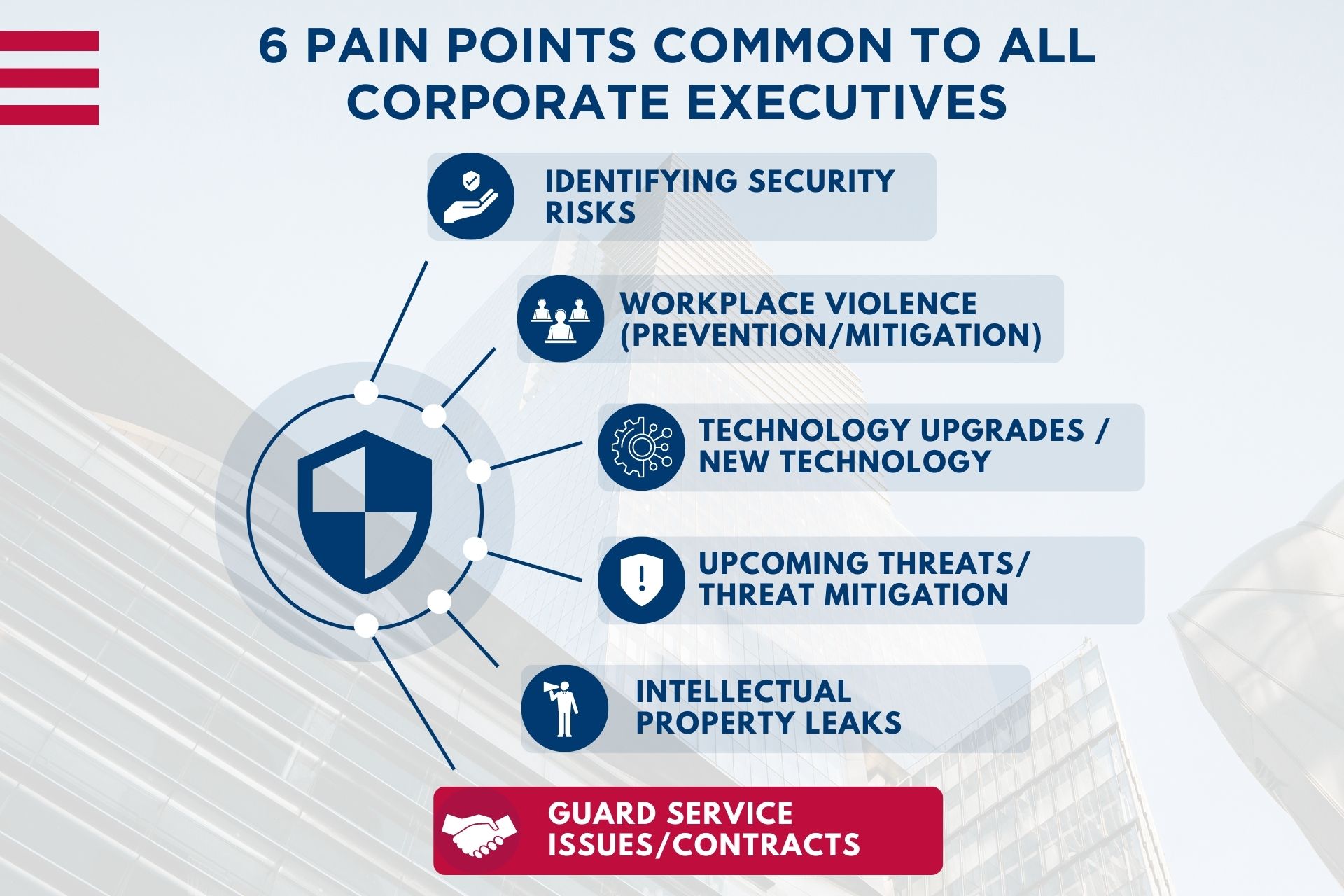
Nuance. It is defined as, “a subtle difference in or shade of meaning”. Negotiating security guard contracts is a practice in nuance. There are subtle, distinct components which need to be considered. Guard companies are experts in this. When we compare the rates security companies pay their employees versus the rates they bill their clients, after expenses, there is not much left. The guard companies need to secure volume to be profitable. They also need to obtain every nickel they can from each contract. They are experts in management and budget reductions. How they achieve this is through nuance. Here is what to be aware of to save money.
Corporate executives must carefully navigate the process of negotiating a security guard contract. This task can make the process both time-consuming and stressful. What’s worse, is the fact that the level of safety and security you think you are providing can be an illusion. Identifying what you need and what you expect may very well be different than what you receive. As the saying goes, nothing is simple anymore.
Let’s discuss some of the contract pain points of which you should be aware.
Your expectations of how the security guards conduct themselves, their specific duties, and the steps/actions they need to take in an emergency should be submitted in writing and discussed prior to the commencement of the contract. Most failures and frustrations originate here. You should have a clear understanding of what you expect and have the guard company write up “post orders” for each post. They should write up the orders based on your requirements. You should not write the orders since you could put yourself into a “co-employment” situation. This is something you would want to avoid at all costs.
Another area of discussion should define desired skills and qualifications. At the elemental level, basic training mandated by the State licensing division will be an adequate start. Additional training for the guards should be considered. It not only provides them with better skill sets, but also makes them more satisfied and proud of what they can learn and utilize. The ROI on this training is well worth the investment.
To learn more about the specialized training we offer, please visit our training library or call us at 914-774-2756.
When it comes to supervisors, guard companies tend to “fill holes with bodies.” They find a guard who knows the property, knows the other team members, and seems to get along. But when he/she is placed in a supervisory position without any training, this is asking for trouble. That person is basically being set up for failure. It is important that you insist on a level of training for supervisors prior to them entering that role.
To mitigate this pain point, negotiate the availability for changes or additions to the contract terms, such as adjusting working hours, an increase or decrease in the number of guards based on the organization’s schedule fluctuations, or requesting specialized training for certain security procedures. The negotiated billable rate should not change if the hours are increased or decreased.
An additional customization would be “Contingency staffing”, meaning having a “bench.” Smaller guard companies today are having an exceedingly tough time trying to obtain and maintain staffing. Your contract should include staffing requirements which include contingency staffing. These are guards that have been trained to work at your facility, are familiar with the systems you have and can fill in without any drop-in customer service.
Executives often struggle with the lack of performance metrics and accountability mechanisms in security guard contracts. Without clearly defined metrics to measure the guards’ performance, it becomes challenging to assess the effectiveness of the security program and hold the security guard company accountable.
To begin, every company we have ever had the opportunity to sit and negotiate with always replies to every request with “We can do that, no problem.” Although some of these companies had the ability to perform as requested, many others did not. Establish a set of metrics to which the company can be held and review these metrics at regularly scheduled monthly meetings. Do not wait for a crisis to meet.
Examples of metrics could include items such as billing, incidents and the response to them, supervisory issues, and preparation for upcoming events to anticipate needed additional staff.
Have the security company identify the Non-Billable Overtime (NBOT) percentage number and include this figure in their monthly report. The NBOT is the number of overtime hours that the security company paid to their guards which cannot be billed to the client. For example, when a guard calls off for illness or other reason, the security company must put someone in that position, most often this ends up being someone on overtime. The OT costs in this case are borne by the guard service, not your company. Many corporate executives are not even aware of NBOT, but they should be looking at it. This number is a particularly good indicator of how well the account is being managed.
Additionally, if the company is understaffed, some posts will not get covered, resulting in what are known as “dark posts”. These are posts that are vacant when they should be staffed. If you are not paying attention, this could go unnoticed and unchecked. The guard company saves on costs, and if you are not paying close attention, you could be billed for the regular shift not covered.
For corporate executives, managing costs and staying within the budget is a constant concern. Negotiating security guard contracts that strike a balance between quality and affordability can be particularly challenging.
One area which can hit the budget hard is the overtime category. Your contract should ensure that any requests that you make for additional guards will be billed at regular hourly rates. If necessary, negotiate the timeline to 48 to 72 hours required prior notice. Last-minute changes will be billed at the overtime rate.
Another area of budget concern is the rate that you are charged for any overtime hours. Ensure that the security company does not charge you 1.5 times the BILL rate for OT. Security guards are paid 1.5 times their HOURLY rate. Your bill rate includes charges for things like uniform, training, etc., so those percentages should be calculated out. Billable OT rates should be calculated at 1.2 – 1.3 times the billable rate. Over a period of time this can really add up.
One specific term in a multi-year contract you should note, will be the “Yearly Mark-up Percentage.” This is the rate increase that the guard service company will charge each year of the contract. Most will try to put into the contract a rate of anywhere from 3% to 5% annually. While the charge is appropriate and covers the increases the company will be incurring, the actual rate you should be asking and negotiating for is between 1% and 1.25%. While the difference appears to be small, it does add up.
A review of any open invoices is another metric to review. Many open invoices can be the result of the guard company submitting inaccurate invoices for services rendered. This causes rejection on the client side, and reissuance of the invoices, which can take 20 to 30 days to re-issue. Most corporations will tolerate 60 to 90 days. It can become an accounting problem for you if the open invoices are extended by six or more months. I have seen invoices carried over from the prior year and remaining open as late as August.
A final point to note is in large portfolios, where you have maybe 10 or more buildings, is to consider asking for an “MSA” or Master Service Agreement. Combining all the properties under one master agreement should get you a significant percentage discount. While the size of the discount is dependent upon the size of each account and number of total buildings, it can add up to a substantial savings over a five year contract.
Contract negotiations for guard services are more involved than many people realize. Knowing these key points and discussing them with the potential supplier will not only save you money but reduce your level of frustration when dealing with the issues that are certain to arise. A little planning goes a long way.
If you need assistance in your contract negotiation or want to discuss an upcoming contract, please call our office to schedule a “STAR Power Session”. Each session is tailored to your organization, your goals and your unique concerns. You will leave each session with actionable steps that you or your team can implement immediately. Call today – 914-576-8706 or learn more about STAR Power Sessions.
Is your business prepared to face today’s ever-evolving security risks? Learn how to identify and overcome critical threats with our previous blog post: Safeguard Your Business: Identifying & Overcoming Critical Security Risks (Part 1 of 6).
If you would like to discuss any of the pain points described above, we encourage you to call our office at 914-576-8706 to set up a free consultation session.
Don’t forget to subscribe to PCC Insights to get email notification when we post our next blog!

Unlock the full potential of your security and risk management with our expert-guided STAR Power Sessions. Get personalized coaching tailored to your organization’s unique needs. Don’t leave your business vulnerable – Book Your STAR Power Session Now!

